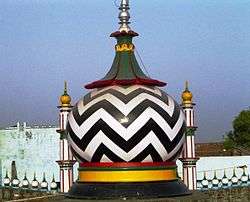Husamul Haramain
Husamul Haramain or Husam al Harmain Ala Munhir kufr wal myvan (The Sword of the Haramayn at the throat of unbelief and falsehood) 1906, is a treatise written by Ahmad Raza Khan Muhaddith (1856- 1921) which declared the founders of Deobandi, Ahle Hadith and Ahmadiyya movement as heretics.[1][2][3][4] In defense of his verdict Ahmad Raza Khan obtained confirmatory signatures from 268 Sunni scholars in the South Asia,[5] and also got agreement from a number of ulama in Mecca and Medina

The treatise is published in Arabic, Urdu, English, Turkish and in Hindi language and its pledge is mandatory in main Sunni Barelvi institute i.e. Al Jamiatul Ashrafia.[6]
Husamul Haramain
According to author of Husam ul Haramayn, Ahmad Raza Qadri, writings in following books tended to destroy the doctrinal foundations of Islamic orthodoxy and amount to heresies.[1][7]
- Writings of founder of Ahle Hadith movement
Shah Ismail Shaheed scholarly treatise Taqviatul Iman (The Power of Faith) which was directed against another book, Kitabal Tawhid written by Muhammad bin Abdul Wahab Najdi in which according to Imam Ahmed Raza, he deliberately ignored the doctrine of Risalat and the Finality of the Prophethood of Hazrat Muhammad.
- Writings of Deobandi movement founders
In 1874 A.D. Muhammad Qasim Nanotvi of Deoband school wrote Tahzeerun Nas (Warning/condensation of People), in 1887 A.D. Khalil Ahmad Saharanpuri wrote Brahin-e-Qa’tia (The Arguments in Refutation), and it was followed by another important work in 1901 A. D. by Ashraf Ali Thanvi entitled, Hifzul Iman (Protection of faith). The Rashid Ahmad Gangohi wrote an extensive work entitled, Fatawa-e-Rashidiya (Religious verdicts of Rahsid). In Taqviat ul Emaan (Power to Believes) , Ashraf Ali Thanvi writes many abusive terms for the Islamic Prophet Muhammed, as in a place he says that “ Knowledge is of two types, Partial and that covers all. If the Prophet is considered to possess the partial knowledge then what is his uniqueness in this? As this knowledge is also possessed by animals, birds and mad people also.’’
- Writings of founder of Ahmadiyya
Mirza Ghulam Ahmad Qadiyani’s book entitled, Khutbat-e-Ghulamiya (Speeches of Gulam Ahmad) in which he claimed for himself the status of prophet hood.
On the basis of writings of above scholars in their books Imam Ahmed Raza Khan Qadri accused the founders of Deobandis, Ahle Hadith and Ahmadiyya movement of not bestowing sufficient respect upon the Prophet—and thus he, found them guilty of heresy and blasphemy.[4]
Support and confirmation to Husamul Haramain
In 1905 Ahmad Raza visited Holy places in Hejaz for performing pilgrimage. During this period he prepared a draft document entitled Al Motamad Al Mustanad (The Reliable Proofs) in which he copied and refuted opinions of founders of Deobandi, Ahle Hadith and Ahmadiyya movement for presentation to the eminent Ulamas of Mecca and Madina. Imam Ahmad Raza collected scholarly opinions of the Ulama of Hejaz and compiled them in a compendium written in Arabic language with the title, Husam al Harmain (The Sword of two sanctuaries).This volume contain the thirty-three scholar’s thirty -four verdicts (20 Meccan and 13 Medina Ulama). All of them gave their verdicts based on the consensus, that founders of Deobandi, Qadiyani and Ahle Hadith factions were apostate and blasphemers. They also exhorted those at the helm of affairs of the Islamic state to indict and punish them according to the Shariah law. If these heretics do not resort to repentance after imprisonment, the head of the state must order their execution. This is mandatory obligation of the rulers to kill the apostates.[8][9][10] The fatawa was publicized during Haj ceremony.[11] The verdict also got confirmatory signatures from 268 traditional Sunni scholars in the South Asia,[12]
See also
References
- 1 2 "Trysts with Democracy". google.co.in.
- ↑ "Muslimischer Nationalismus, Fundamentalismus und Widerstand in Pakistan". google.co.in.
- ↑ Usha Sanyal Devotional Islam and Politics in British India: Ahmad Raza Khan Barelwi and His Movement, 1870–1920
- 1 2 https://hudson.org/content/researchattachments/attachment/1283/kahn_vol12.pdf
- ↑ "Holy Quran's Judgement ? Part 2". google.co.in.
- ↑ "Islamic Reform in South Asia". google.co.in.
- ↑ "'Aqa'id-i 'ulama-yi Diyoband aur Husam al-haramain". google.co.in.
- ↑ Gregory C. Doxlowski. Devotional Islam and Politics in British India: Ahmad Riza Khan Barelwi and His Movement, 1870-1920. The Journal of the American Oriental Society, Oct–Dec, 1999
- ↑ Husamul Haramain, Imam Ahmed Raza Khan, published by Raza Academy, 2005,P 32-50
- ↑ "Islamic Legal Interpretation". google.co.in.
- ↑ "Article: Religious denunciations and Takfir: Isn't there enough to go around? by Dr. Mohammad Omar Farooq". globalwebpost.com.
- ↑ "Holy Quran's Judgement ? Part 2". google.co.in.
Further reading
- The Enemy within: Madrasa and Muslim Identity in North India by Arshad Alam, Modern Asian Studies Vol. 42, No. 2/3, Islam in South Asia (Mar. - May, 2008), pp. 605–627
- Holy Quran's Judgement, Part 2 By M.S.M Abdullah
- Who is a Muslim? Identities of exclusion—north Indian Muslims, c. 1860–1900, S.A. Zaidi,Independent Scholar, Karachi
- Madrasas in South Asia: Teaching Terror? edited by Jamal Malik, Professor and Chair of Religious Studies - Islamic Studies Jamal Malik
- Taqweeyat-ul Imaan" by Ismaeel Dehlwi
- "Seerate Mustaqeem" by Ismaeel Dehlwi
- Fatawa Rasheedia" by Rasheed Ahmed Gangohi

